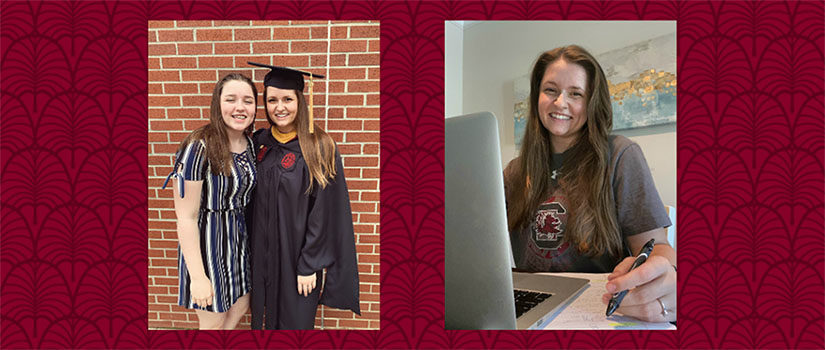June 29, 2020
Chris Woodley • cwoodley@mailbox.sc.edu
It was May 9, 2019 when alumna Shelby Thornhill, BSW ’18, MSW ’19, walked across the stage at the Master of Social Work Hooding ceremony. She had completed the MSW Advanced Standing program, one year after graduating with her Bachelor of Social Work degree. But Thornhill’s first year in the social work field was unlike any experienced by previous graduates.
Prior to beginning her job search, Thornhill and her fiancé traveled through Europe for a month. Upon returning in mid-June, she was fortunate to receive an offer after only two interviews and accepted a position as a social worker at the South Carolina Department of Mental Health’s Forensic Evaluation Service. While Thornhill says it’s a perfect job, she initially never knew the position existed.
“I first applied at the Department of Mental Health for another job, and I think having my name within the system helped me get an interview for my current position,” Thornhill says. “It wasn’t until the interview that I began to learn about forensic and legal social work.”
Finding an unexpected job was similar to Thornhill’s experience at orientation before beginning her undergraduate studies in 2014. She planned to study criminal justice but changed her major once she discovered that the University of South Carolina had its own school for social work.
“I did an internship at our local police department as part of a graduation requirement in high school and met a woman who basically did social work,” Thornhill says. “I thought criminal justice was the career path that would eventually lead to social work.”
Thornhill’s job has a criminal justice aspect since all her clients are either in jail or out on bond. The Department of Mental Health and the Medical University of South Carolina are the only two agencies in the state that perform forensic evaluations.
“With a psychiatrist or licensed psychologist as the first examiner, I serve as a second examiner for three types of forensic evaluations: competency to stand trial, criminal responsibility, and capacity to conform,” Thornhill says. “We sit in on all the evaluations as witnesses and ask questions. I also request any essential records we might need and complete a collateral interview with a family member. It helps get the most broad and complete picture of a client’s mental health.”
The clinical aspects are part of the reason why Thornhill enjoys her job. She specialized in health and mental health during her graduate studies and now examines those diagnoses in detail.
“I learn more about a new client’s mental health history from a different point of view,” Thornhill says. “Meeting the client in person and examining them before talking to doctors about the different diagnoses has given me a much deeper look into clinical social work than I ever imagined.”
Dr. (Candice) Morgan was my field supervisor, and I could approach her with anything. That’s been beneficial in my professional career because I can talk to my supervisor about any questions or problems. You don't realize how much of an influence a professor has on you until you're out in the real world.
- Shelby Thornhill
But like most employees across the country, COVID-19 has affected Thornhill’s job. Since the Forensic Evaluation Service is within the Division of Inpatient Services, her job is considered critical, one level higher than essential. But there is an added concern that if a client is diagnosed or Thornhill or one of her colleagues has the coronavirus, it could spread to the jail and contaminate a population of people confined together. To prevent this scenario, connecting with her clients virtually through telehealth has become an important tool.
“We did not do any evaluations at first because we did not know enough about the virus and could not determine how to do our work safely, so I started working from home,” Thornhill says. “After about a month, we received equipment to do telehealth with the jails and work with our clients virtually. For a while, I was still doing social histories, talking to family members, obtaining records, and preparing the charts from home because I knew there would be a back log. But telehealth has been very helpful.”
COVID-19 has also affected Thornhill’s personal life and plans. Her May wedding was postponed indefinitely and her fiancé’s graduation ceremony from the UofSC School of Law was cancelled. Because of her job, she cannot leave the state and is unable to visit her family in Virginia. Thornhill eventually plans to have her family travel to South Carolina and have a socially distanced wedding ceremony. But even through the difficult circumstances, she finds ways to stay positive.
“It's been hard because this is my first year as a true South Carolinian,” Thornhill says. “But amid the anxiety, there has been a great deal of self-care and relaxation when I'm working from home while my fiancé is studying for the bar. We joke that we never thought we would get another summer vacation together. It's been hard because we’re sad about things being cancelled but understand that other people may have it harder than us.”
While Thornhill’s first year of her professional career has been unprecedented for anyone entering the workforce, she enjoys her job and is fortunate to have chosen social work. She describes her first job as “hitting the jackpot.”
“When some people learn about my job and what some of my clients are accused of, they say, 'I could never do that,' or 'It's not for me.' But it’s a perfect job for me, and I really enjoy my work,” Thornhill says. “The best thing about my job is that there are only four social workers in the office, so we are each given a great deal of responsibility because there are so few of us and our caseloads are substantial. It's been nice to enter the working world and dive in headfirst.”
